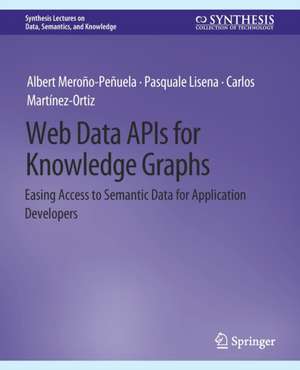Web Data APIs for Knowledge Graphs: Easing Access to Semantic Data for Application Developers: Synthesis Lectures on Data, Semantics, and Knowledge
Autor Albert Meroño-Peñuela, Pasquale Lisena, Carlos Martínez-Ortizen Limba Engleză Paperback – 22 sep 2021
Din seria Synthesis Lectures on Data, Semantics, and Knowledge
- 20%
 Preț: 389.31 lei
Preț: 389.31 lei - 20%
 Preț: 413.47 lei
Preț: 413.47 lei - 20%
 Preț: 419.10 lei
Preț: 419.10 lei -
 Preț: 412.14 lei
Preț: 412.14 lei -
 Preț: 360.01 lei
Preț: 360.01 lei -
 Preț: 234.87 lei
Preț: 234.87 lei -
 Preț: 263.28 lei
Preț: 263.28 lei -
 Preț: 173.12 lei
Preț: 173.12 lei -
 Preț: 247.72 lei
Preț: 247.72 lei -
 Preț: 279.80 lei
Preț: 279.80 lei -
 Preț: 451.48 lei
Preț: 451.48 lei -
 Preț: 448.31 lei
Preț: 448.31 lei -
 Preț: 319.12 lei
Preț: 319.12 lei -
 Preț: 234.87 lei
Preț: 234.87 lei -
 Preț: 386.30 lei
Preț: 386.30 lei -
 Preț: 351.41 lei
Preț: 351.41 lei -
 Preț: 208.41 lei
Preț: 208.41 lei -
 Preț: 191.30 lei
Preț: 191.30 lei -
 Preț: 191.30 lei
Preț: 191.30 lei -
 Preț: 265.78 lei
Preț: 265.78 lei -
 Preț: 209.94 lei
Preț: 209.94 lei - 20%
 Preț: 281.14 lei
Preț: 281.14 lei
Preț: 381.89 lei
Preț vechi: 477.35 lei
-20% Nou
Puncte Express: 573
Preț estimativ în valută:
73.07€ • 76.51$ • 60.61£
73.07€ • 76.51$ • 60.61£
Carte tipărită la comandă
Livrare economică 09-23 aprilie
Preluare comenzi: 021 569.72.76
Specificații
ISBN-13: 9783031007897
ISBN-10: 3031007891
Pagini: 92
Ilustrații: XXII, 92 p.
Dimensiuni: 191 x 235 mm
Greutate: 0.21 kg
Editura: Springer International Publishing
Colecția Springer
Seria Synthesis Lectures on Data, Semantics, and Knowledge
Locul publicării:Cham, Switzerland
ISBN-10: 3031007891
Pagini: 92
Ilustrații: XXII, 92 p.
Dimensiuni: 191 x 235 mm
Greutate: 0.21 kg
Editura: Springer International Publishing
Colecția Springer
Seria Synthesis Lectures on Data, Semantics, and Knowledge
Locul publicării:Cham, Switzerland
Cuprins
Foreword by Tobias Kuhn.- Preface.- Acknowledgments.- Knowledge Graphs of Linked Data.- Accessing Knowledge Graphs Programmatically.- Shaping JSON Results: \emph {SPARQL Transformer.- Applications.- Conclusion and Future Challenges.- Bibliography.- Authors' Biographies.
Notă biografică
Albert Meroño-Peñuela is a Lecturer (Assistant Professor) in Computer Science and Knowledge Engineering in the Department of Informatics of King’s College London (United Kingdom). He obtained his Ph.D. at the Vrije Universiteit Amsterdam in 2016, under the supervision of Frank van Harmelen, Stefan Schlobach, and Andrea Scharnhorst. His research focuses on Knowledge Graphs, Web Querying, and Cultural AI. Albert has participated in large Knowledge Graph infrastructure projects in Europe, such as CLARIAH, DARIAH, and Polifonia H2020, and has published research in ISWC, ESWC, the Semantic Web Journal, and the Journal of Web Semantics. He is, together with Rinke Hoekstra, the original author of grlc, and together with Carlos Martínez-Ortiz, its main current maintainer.
Pasquale Lisena is a researcher in the Data Science department at EURECOM, Sophia Antipolis (France). He obtained his Ph.D. in Computer Science from Sorbonne University of Paris in 2019, with a thesis on music representation and recommendation, under the supervision of Raphaël Troncy. His research focuses on Semantic Web, Knowledge Graphs, and Information Extraction, with particular application to the domain of Digital Humanities, contributing on AI projects such as DOREMUS, SILKNOW, and Odeuropa. Pasquale’s work has been published in leading conferences in the field, such as ISWC, EKAW, and ISMIR. Given his past background as a web developer, his interest also involves data usability in web applications and human-computer interaction. He is the main author of SPARQL Transformer.
Carlos Martínez-Ortiz is a community manager at the Netherlands eScience Center. He obtained his Ph.D. in Computer Science at the University of Exeter (United Kingdom). Afterward, he worked on various research projects at the University of Exeter, Plymouth University, and the eScience Center. These projects were in collaboration with industrial and academic partners in diverse fields such as veterinary science, digital humanities, and life sciences. He has been involved in large projects such as CLARIAH and ODISSEI and works in close collaboration with partners such as SURF, DANS, and The Software Sustainability Institute. His current research interests include linked open data, natural language processing, and software sustainability.
